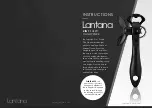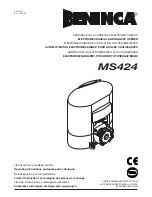
4
2.3) Typical system layout
In order to explain certain terms and aspects of an automatic 2-leaf
swing door or gate system, we will now illustrate a typical system
layout.
In particular, please note that:
• All the photocells produced by NICE feature the SYNCHRONISM
system which eliminates the problem of interference between two
pairs of photocells (please consult the photocell instructions for
further details).
• The “PHOTO” pair of photocells have no effect during opening
while they invert movement during closing.
• The “PHOTO1” pair of photocells stops both the opening and
closing manoeuvres.
• The “PHOTO2” pair of photocells (connect to the suitably
programmed AUX input) have no effect during closing while they
invert movement during opening.
2.2) Fixing the A400 control unit
The container is fitted with a cover which protects the electronic
board from accidental contact.
Only touch the board when necessary by proceeding as shown in
figure 1a.
To make it easier to make holes in the lower part of the container,
lower the plastic bottom as shown in
figure 1a, ref. 1.
2.4) Electrical connections
To protect the fitter and avoid damaging the
components while electrical connections are being made
or the radio receiver is being connected, under no
circumstances may the unit be electrically powered.
• If the inputs of the NC (Normally Closed) contacts are not used
they should be jumped with the “24V Common” terminal (except
for the photocell inputs; for information please see the
PHOTOTEST function).
• If there is more than one NC contact on the same input, they must
be connected in SERIES.
• If the inputs of the NO (Normally Open) contacts are not used they
should be left free.
• If there is more than one NO contact on the same input, they must
be connected in PARALLEL.
• The contacts must be mechanical and potential-free; no stage
connections are allowed, such as those defined as "PNP", "NPN",
"Open Collector", etc..
• The starting condenser is built into the WINGO motors.
!
1
1a
PHOTO
1
PHOTO
PHOTO 2
6
7
1
1
4
2
3
5
1.
Elettromechanical actuators
2.
Flashing lamp
3.
“A400” control unit
4.
Key switch
5.
“PHOTO” pair of photocells
6.
“PHOTO1” pair of photocells
7.
“PHOTO2” pair of photocells
ref. 1





































